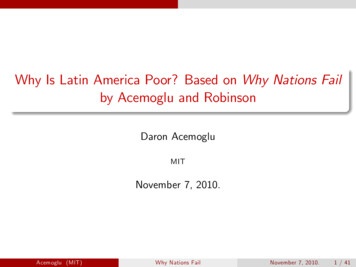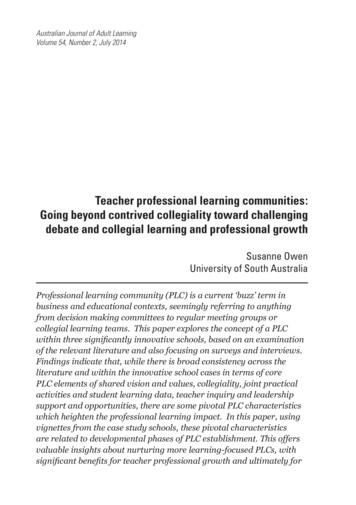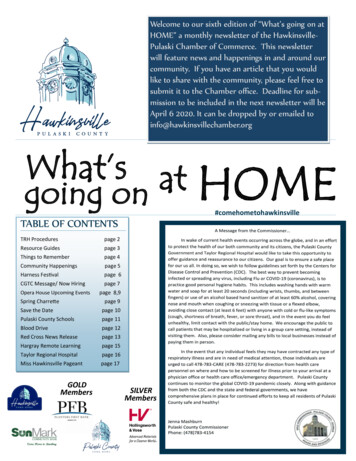
Transcription
Wendell BerryWhy I Am Not Going to Buy a ComputerLike almost everybody else, I am hooked to the energy corporations, which I do not admire. I hope to become less hooked tothem. In my work, I try to be as little hooked to them as possible.As a farmer, I do almost all of my work with horses. As a writer,I work with a pencil or a pen and a piece of paper.My wife types my work on a Royal standard typewriter boughtnew in 19 6, and as good now as it was then. As she types, shesees things that are wrong, and marks them with small checks inthe margins. She is my best critic because she is the one most familiarwith my habitual errors and weaknesses. She also understands,sometimes better than I do, what ought to be said. We have, Ithink, a literary cottage industry that works well and pleasantly.I do not see anything wrong with.it.A number ofpeople, by now, have told me that I could greatlyimprove things by buying a computer. My answer is that I am notgoing to do it. I have several reasons, and they are good ones.The first is the one I mentioned at the beginning. I would hateto think that my work as a writer could not be done withouta direct dependence on strip-mined coal. How could I writeconscientiously against the rape of nature if I were, in the act ofwriting, implicated in the rape? For the same reason, it mattersto me that my writing is done in the daytime, without electric light.I do not admire the computer manufacturers a great dealmore than I admire the energy industries. I have seen theiradvertisements, attempting to seduce struggling or failing farmersinto the belief that they can solve their problems by buying yetanother piece of expensive equipment. I am familiar with theirpropaganda campaigns that have put computers into public schoolsin need of books. That computers are expected to become as common as TV sets in uthe future" does not impress me or matter tome. I do not own a TV set. I do not see that computers are bringing us one step nearer to anything that does matter to me: peace,economic justice, ecological health, politkal honesty, family andcommunity stability, good work.What would a computer cost me? More money, for one thing,than I can afford, and more than I wish to pay to people whomI do not admire. But the cost would not be just monetary. It is112
well understood that technological innovation always requires thediscarding of the uold model" - the Uold model" in this case being not just our old Royal standard, but my wife, my critic, myclosest reader, my fellow worker. Thus (and I think this is typicalofpresent.day technological innovation), what would be supersededwould be not only some thing, but some body. In order to betechnologically up-to-date as a writer, I would have to sacrificean association that I am dependent upon and that I treasure.My final and perhaps my best reason for not owning a computer is that I do not wish to fool myself. I disbelieve, and thereforestrongly resent, the assertion that I or anybody else could writebetter or more easily with a computer than with a pencil. I donot see why I should not be as scientific about this as the nextfellow: When somebody has used a computer to write work thatis demonstrably better than Dante's, and when this better isdemonstrably attributable to the use of a computer, then I willspeak of computers with a more respectful tone of voice, thoughI still will not buy one.To make myself as plain as I can, I should give my standardsfor technological innovation in my own work. They are as follows:1. The new tool should be cheaper than the one it replaces.2. It should be at least as small in scale as the one it replaces.3. It should do work that is clearly and demonstrably betterthan the one it replaces.4. It should use less energy than the one it replaces.5. If possible, it should use some form of solar energy, suchas that of the body.6. It should be repairable by a person ofordinary intelligence,provided that he or she has the necessary tools.7. It should be purchasable and repairable as near to home aspossible.8. It should come from a small, privately-owned shop or storethat will take it back for maintenance and repair.9. It should not replace or disrupt anything good that alreadyexists, and this includes family and community relationships.113
HARPERsLETTERS EditorLewis H. LaphamExecuci"e EdiwrMichael PollanSenior Edic,,,.,Gerald Manorati, Jack HittM(""'I. ng EditorTonicc SgcignoliDeborah Rust, Arc DirectorAssociace EdiwrsCharis W. Conn, I1ena SilvermanElliott Rabin, Assistant EditorKaren Hoffman, Ediwrial AssistancAnn K. Stern, Assiscant w the EdicorTechnologicalFundamentalismInternsEmily Barker, Wendell Smith,Jonathan ZarovContribucing EdiwrsL. J. Davis, Mark Edmundson,Francisco G lldman, Vicki Hearne,Walter Karp. Craig S. Karpel, Barry Lopez,Peter Marin, George Plimpton,Bob Shacochis, Earl Shorris,Jacqueline Simon, Eric Trcisman,Philip Weiss, Tom WolfeWashin.,on EdiwrsChristopher Hitchens,Fred Reed, John TaftJohn R. MacArthur, Presidenc and PublisherVice Presidenc and General ManagerDouglas E. EllisVice President. Corporace and Public Affair.Randall V. WarnerV ice President, Ad"errisinR DirectcTTVictoria ReisenbachVice President. CircularifmPatricia HartAcc()l(nt Represel1wrivesEvan Green, James Max Lane,Mary Anne MalleyDiane Kraft, Assistant tIJ the PublisherLinda McNamara, Ad.,.ising CcH".dinaco,.Benjamin Boveroux, Circulati,," AssisklntsklrfJoseph Malits, Lisa Kay Greissinger,Jolie ShulmanSean O'Connell, InternADVERTISING SALES OFFICES666 Bruadway, New·York, New York 10012(212) 614-6500Detmic ManagerMary Anne Malley (212) 614-6518West CoastMackin Media Inc.Los Angeles (213) 850-8139San Fmncisco (415) 362-83396Wendell Berry ["Against PCs,"Readings, September] provides writers enslaved by the computer with ahandy alternative: Wife-a low-techenergy-saving device. Drop a pile ofhandwritten notes on Wife and youget back a finished manuscript, editedwhile it was typed. What computercan do that? Wife meets all of Berry'suncompromising standards for technological innovation: she's cheap, repairable near home, and good for thefamily structure. Best of all, Wife ispolitically correct because she breaksa writer's "direct dependence on stripmined coa!."History teaches us that Wife canalso be used to beat rugs and washclothes by hand. thus eliminating theneed f()r the vacuum cleaner andwashing machine, two more nastymachines that threaten the act ofwriting.Gordon InkelesMiranda, Calif.I have no quarrel with Berry because he prefers to write with penciland paper; that is his choice. Buthe implies that I and others are somehow impure because we choose towrite on a computer. I do not admirethe energy corporations, either. Theirshortcoming is not that they produceHarper's Magazine welcomes Letters to theEditor. ShoTt letters are more likely to be published, and all letters are subject to editing.Letters must be tYl ed double-spaced; volumeprecludes individual acknowledgment.HARPER'S MAGAZINEIDECEMBER 1988Berry, Wendell, Letters: An exchange on computers, Harper's, 277:1663 (l988:Dec.)electricity but how they go about it.They are poorly managed becausethey are blind to long-term consequences. To solve this problem,wouldn't it make more sense to correct the precise error they are makingrather than simply ignore their product? I'would be happy to join BerT) ina protest against strip mining, but Iintend to keep plugging this computerinto the wall with a clear conscience.James RhoadsBattle Creek, Mich.I enjoyed reading Berry's declaration of intent never to buy a personalcomputer in the same way that I enjoyreading about the belief systems ofunfamiliar tribal cultures. I tried toimagine a tool that would meet Berry's criteria for superiority to his oldmanual typewriter. The clear winneris the quill pen. It is cheaper, smaller,more energy - efficient, humanpowered, easily repaired, and nondisruptive of existing relationships.Berry also requires that this toolmust be "clearly and demonstrablybetter" than the one it replaces. Butsurely we all recognize by now that"better" is in the mind ofthe beholder. To the quill pen aficionado, thebenefits obtained from elegant cailigraphy might well outweigh all others.I have no particular desire to seeBerry use a word processor; if hedoesn't like computers, that's finewith me. However, I do object to hisportrayal of this reluctance as a moralvirtue. Many of us have found thatcomputers can be an invaluable toolin the fight to protect our environment. In addition to helping me
write, my personal computer gives meaccess to up-to-the-minute reportson the workings of the EPA and thenuclear industry. I participate in electronic bulletin boards on which environmental activists discuss strategyand warn each other about urgentlegislative issues. Perhaps Berry feelsthat the Sierra Club should eschewmodem printing technology, which ishighly wasteful of energy, in favor ofhaving its members hand-copy theclub's magazines and other mailingseach month?Nathaniel S. BorensteinPittsburgh, Pa.The value of a computer to a writeris that it is a tool not for generatingideas but for typing and editingwords. It is cheaper than a secretary(or a wife!) and arguably more fuelefficient. And it enables spouseswho are not inclined to provide freelabor more time to concentrate ontheiT own work.We should support alternativesboth to coal-generated electricity andto IBM-style technocracy. But I amreluctant to entertain alternativesthat presuppose the traditional subservience of one class to another. Letthe PCS come and the wives and servants go seek more meaningful work.Toby KoosmanKnoxville, Tenn.Berry asks how he could write conscientiously against the rape of natureif in the act of writing on a computerhe was implicated in the rape. I findit ironic that a writer who sees theunderlying connectedness of thingswould allow his diatribe against computers to be published in a magazinethat carries ads for the National Rural Electric Cooperative Association,Marlboro, Phillips Petroleum, McDonnell Douglas, and, yes, evenSmith-Corona. If Berry rests comfortably at night, he must be using sleeping pills.Bmdley C. lohnsonGrand Forks, N. D.Wendell Berry Teplies:The foregoing letters surprised mewith the intensity of the feelings theyexpressed. According to the writers'testimony, there is nothing wrongwith their computers; they are utterlysatisfied with them and all that theystand for. My correspondents are certain that I am wrong and that I am,moreover, on the losing side, a sidealready relegated to the dustbin of history. And yet they grow huffy andcondescending over my tiny dissent.What are they so anxious about?I can only conclude that I havescratched the skin of a technologicalfundamentalism that, like other fundamentalisms, wishes to monopolizea whole society and, therefore, cannot tolerate the smallest differenceof opinion. At the slightest hint ofa threat to their complacency, theyrepeat, like a chorus of toads, thenotes sounded by their leaders in industry. The past was gloomy, drudgery-ridden, servile, meaningless, andslow. The present, thanks only topurchasable products, is meaningful, rth Flag Is e-;:;i;:;:. O g:;-d-:;blePOlyeS Gro e for outside use and/or mdoor mounting. Full 3' x 5' size 39.00. Add 2.50 shipping & handhng. Bulk order pricing available.'"Earth Flag Co. Box 108 Middleville, NJ 078551 (800) 237-1113In N.Y. (718) 447- 6777I NameI ShipI OBank Check or M.O·D MC#L - -- Expires0Visa#I'IIII-l
IIThis book will make youlaugh with your heart 'A. /n your rrl/ndTHE JOURNAL. fie/ion.OF SEXpfJOtographyAND SENSIBILITY-SPAULDING GRAY"A masterly storyteller with a dark,urban edge, he is confessional, heartfelt, bitterly funny .Mike Feder's truestories often i"terweove very i"timatepersonal reminiscences with reflectlone,; that capture the texture of urbanlife in rich, gripping detai ."New York TimesNow at your bookstore.ArtFOR PEOPLE.YumarWHO THINKPoetryINTELLIGENTFunEROTICAOuarter y/ 20'Sample/Sf;DOESN'TPOBox 1467Pl Ollcago, 1 j(J6 1 4EXIST.IC:::: PUBLISHERS Inc,225 Pork Ave. South, N.Y., N.Y. 10003---------bright, lively, centralized, and fast.The future, thanks only to more purchasable products, is going to be evenbetter. Thus consumers become salesmen, and the world is made safer forcorporations.I am also surprised by the meannesswith which two of these writers referto my wife. In order to imply that I ama tyrant, they suggest by both directstatement and innuendo that she issubservient, characterless, and stupid-a mere "device" easily forced toprovide meaningless "free labor." Iunderstand that it is impossible tomake an adequate public defense ofone's private life, and so I will onlypoint out that there are a number ofkinder possibilities that my criticshave disdained to imagine: that mywife may do this work because shewants to and likes to; that she mayfind some use and some meaning in it;that' she may not work for nothing.These gentlemen obviously thinkthemselves feminists of the most correct and principled sort, and yet theydo not hesitate to stereotype and ir,suit, on the basis of one fact, a womanthey do not know. They are audaciousand irresponsible gossips.In his letter, Bradley C. Johnsonrushes past the possibility of sense inwhat I said in my essay by implyingthat I am or ought to be a fanatic.That I am a person of this century andam implicated in many practices thatI regret is fully acknowledged at thebeginning of my essay. I did not saythat I proposed to end forthwith allmy involvement in harmful technology, for I do not know how to do that.I said merely that I want to limit suchinvolvement, and to a certain extent Ido know how to do that. If some technology does damage to the world-astwo of the above letters seem to agreethat it does-then why is it not reasonable, and indeed moral, to try tolimit one's use of that technology? Ofcourse, I think that I am right to dothis.I would not think so, obviously, iflagreed with Nathan
112 Wendell Berry Why I Am Not Going to Buy a Computer Like almost everybody else, I am hooked to the energy corpora tions, which I do not admire.











